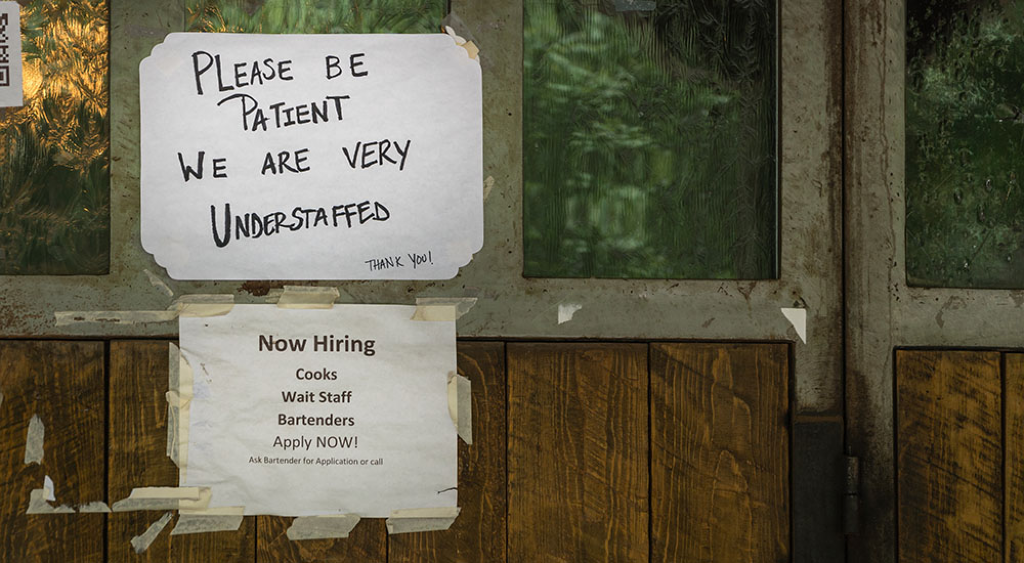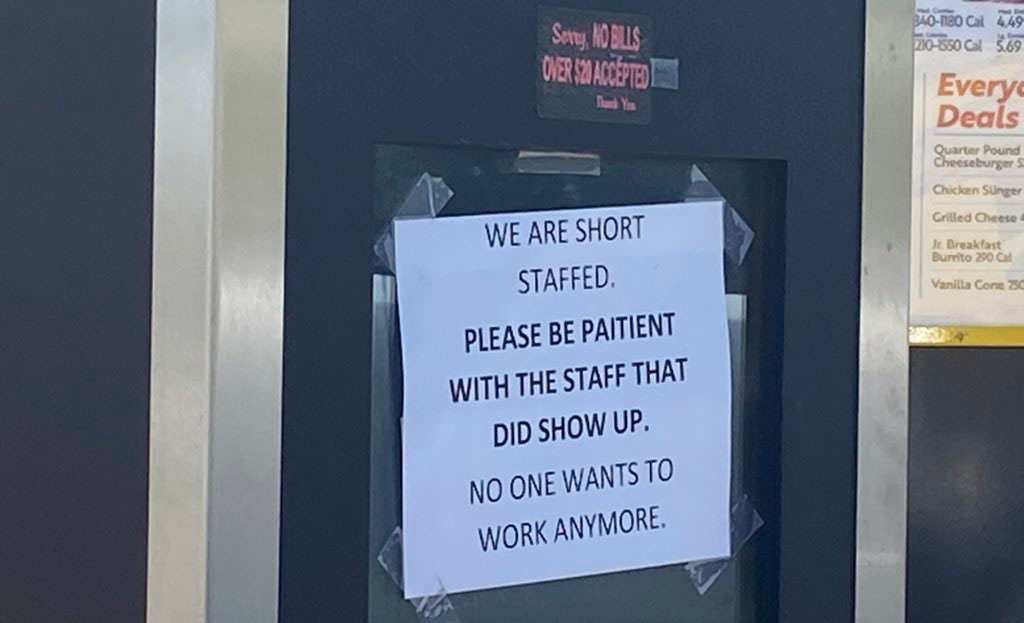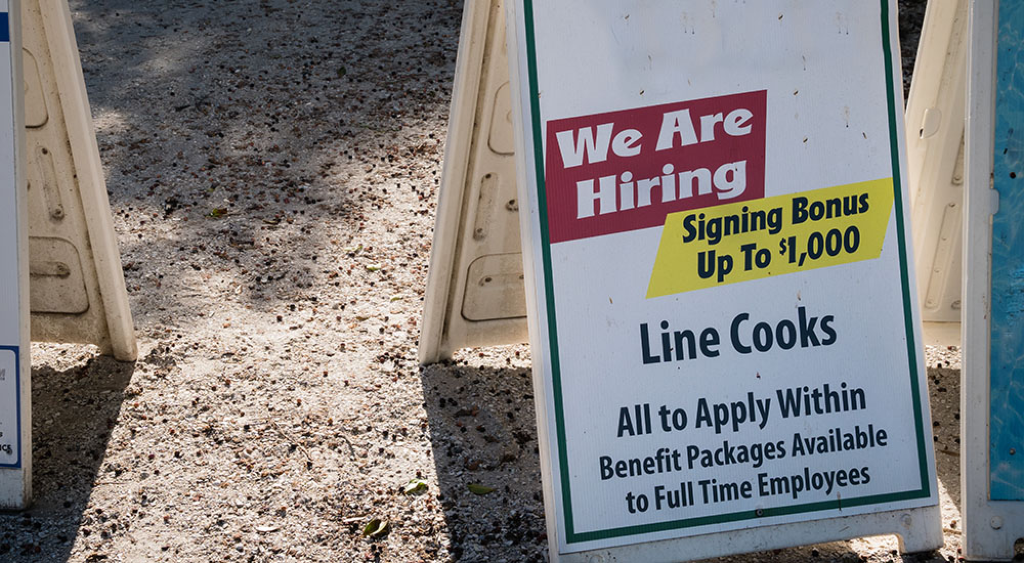Hiring Struggles Force Employers to Pay Higher Wages

- The CARES Act awarded $300 per week in unemployment benefits to those who lost their jobs due to COVID-19.
- Employers argue that government benefits play a role in their hiring struggles.
- Past employees say their demand for higher pay and safety is why they are in no rush to return to the workforce.
On May 10, 2021, President Joe Biden announced that unemployed Americans would no longer be eligible for unemployment benefits if they turned down a suitable job. Many believe President Biden's announcement came as a response to many employers that started to complain of hiring struggles due to the federal government's unemployment benefits.
CARES Act: Unemployment Benefits End
The three hundred dollars ($300) per week in unemployment benefits enacted by the CARES Act ended on Labor Day, September 6, 2021. However, sixteen states, all led by Republican governors, ended their participation in the unemployment program roughly two months early. Those states included Alabama, Arkansas, Arizona, Georgia, Idaho, Iowa, Mississippi, Missouri, Montana, North Dakota, Ohio, South Carolina, South Dakota, Tennessee, Utah, and Wyoming.
The states' governors and representatives spoke out about how the enhanced unemployment benefits were keeping people from looking for jobs. Senator Charles E Grassley (R-IOWA) said, "Common sense tells you that if you want people to go back to work, then the government can't be an unfair competitor by paying people not to work."

Image credit: Patrick Hayes / Twitter: @KOBPatrickHayes
The states that opted out early stopped issuing the extra $300 a week to workers. However, those receiving state benefits will continue getting that aid, which generally amounts to half their pre-layoff wages. According to the Labor Department, the average person received $350 a week in state benefits in March.
Government Benefits and Safety Are Top Reasons People Aren't Returning to Work
Covid-19 tests and vaccines are more readily available, and the CDC recently announced that fully vaccinated people could resume activities without wearing a mask or physically distancing. However, many businesses are still limited in their capacity to operate as they used to before the pandemic hit.
From social media comments to barbershop talk, it is no secret that some people aren't returning to work due to the generous unemployment benefits the U.S. government has offered to those laid off due to the pandemic. In fact, some people receive more income than they would receive at their pre-pandemic jobs. However, economists don't believe benefits from the government are the primary factor in why jobs are struggling to hire.
According to the Wall Street Journal surveys, many people are uncomfortable returning to work due to potentially being exposed to Covid-19. Those who are back working favor jobs that give them more flexibility than traditional retail jobs, such as driving for Uber or delivering food for DoorDash. On the other hand, many parents who would or could be working are forced to stay home to care for their children since many schools or daycares are still closed or open with limited capacity.
Lower Paying Jobs Struggle to Make Hires
Viral videos and photos have shown signs at lower-wage paying jobs, such as fast food restaurants, warning of slow service due to a shortage of workers.

To combat the issue, many are hopeful that it will force jobs to pay above the federal minimum wage, which is $7.25 for nonexempt employees. The fight to raise the minimum wage to $15.00 was started before the pandemic because millions of workers live paycheck-to-paycheck and regularly face financial hardships. With the current hiring struggle, lower-wage-paying employers now acknowledge that to compete and be attractive to potential employees, paying minimum wage won't fill needed positions. To combat hiring difficulties, they must improve their pay, benefits, flexibility, and culture.
The Impact of Raising Wages
Each cause has an effect, which is no different from the potential pay rise. With the increase in wages comes the increase in food prices, and that increased pricing will have to be paid for by the customer. Chipotle CFO Jack Hartung said that a $15 federal minimum wage would increase burrito prices slightly.
While many stand firm in their faith that the hiring struggles will force an increase in wages, others fear that the pay increase will only be short-term, and the long-term focus for lower-wage-paying employers will be automation.
Studies have found strong links between automation and inequality for the past few years. In fact, job-replacing tech has directly driven the income gap since the late 1980s. Of course, the investment in automation is expensive, but an MIT study concluded that across the U.S., from 1993 to 2007, each new robot replaced 3.3 jobs.
The Money Wrap-Up
According to the U.S. Bureau of Labor Statistics, 266,000 jobs were added by employers in April. The unemployment rate rose slightly to 6.1%, which shocked many who expected the unemployment rate to continue trending downwards.
According to the report, 9.8 million people are still unemployed. Pre-Covid-19, only 5.7 million people were unemployed, compared to the 9.8 million today. In February 2020, the unemployment rate sat at 3.5% compared to today's 6.1%.